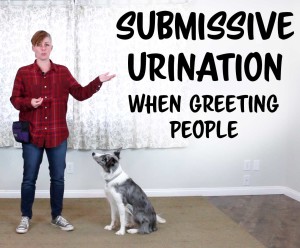 The video below covers how to train and prevent your puppy or adult dog from urinating when greeting a family member, friend or stranger. Some puppies will grow out of this behavior, but for others the behavior can continue into adulthood.
The video below covers how to train and prevent your puppy or adult dog from urinating when greeting a family member, friend or stranger. Some puppies will grow out of this behavior, but for others the behavior can continue into adulthood.
The most important concept to remember is to try and keep your cool if your dog does urinate even though it can feel frustrating and embarrassing especially if the dog pees on the guest’s shoe, something expensive or hard to clean. The problem with acting frustrated or angry is that it will make the dog more likely to submissively pee when greeting you the next time as greeting predicts the person getting angry.
The first plan of action is preventing the behavior from happening by “changing the picture”. All dogs are different and have different stimuli trigger them to urinate. For some dogs it’s even simply the sight of their owner coming through the door after work.
Here is a list of things that can trigger submissive urination:
- The dog has not seen the person for a long time
- A direct approach
- Direct eye contact
- Standing directly in front of the dog
- Leaning over the dog
- Touching the dog – calmly, excitedly or playfully
- Talking to the dog – normally, in a high pitched voice or loud
What you can do instead:
- Wait until the dog has had time to calm down before interacting
- Let the dog approach you rather than approaching the dog
- Avoid a direct approach by walking in an arc toward the dog if you approach
- Avoid direct eye contact and blink at the dog if you do look at the dog
- Stand facing to the side when near the dog
- Don’t lean over, pet or talk to the dog until the dog has had enough time to calm down.
- Pet the dog with the dog at your side rather than directly in front of you.
- Move calmly and slowly.
- Immediately stop interacting with the dog and walk away if you see the dog start to lower their hips, squat or roll over.
Submissive urination is usually more likely to happen during the initial meeting after not seeing the person for a long time or meeting a new person. What you can do is change the dog’s expectation of what will happen during the initial meeting. Instead of what typically happens, an immediate social interaction upon seeing the person, you can make the initial appearance of the person predict something else, for example, being fed, working for treats or getting to go out to go to the bathroom.
With family members
When arriving home, you can change your dog’s motivation by dropping treats on the floor or giving the dog a high value chew. You can also make the initial meeting about going outside to go to the bathroom. Instead of saying “HI!!! FLUFFY!!!” You can open the door and in a casual voice say, “Do you need to go out?” and without looking at your dog walk around your yard looking interested in the bushes or places in the grass. If your dog jumps on you, you can also do this but sprinkle treats in the grass to point out to your dog to get your dog interested in sniffing around.
After your dog has calmed down, say 10 mins after you get home, you can then give your dog the excited attention you wanted to when first seeing your dog. This works great for family members who get over-excited by their dogs, as it gives them also a chance to calm down before interacting with the dog.
With guests
Have your dog on a leash and harness or in a pen and let your dog calm down first before getting to greet the person. You can give your dog treats for settling on his dog bed.
Instead of jumping right into petting, have the guests feed your dog a treat to change the dog’s motivation from greeting to expecting food. You could also get the person to ask your dog for his favorite behaviors or tricks. After each behavior the dog can receive a treat from the person.
You can teach your dog to touch the person’s hand or rest chin in the person’s hand as a behavior so the dog is touching the person at first rather than the person touching the dog.
Ask the guest to stop petting your dog and move away from your dog if you see your dog start to lower his hips, squat or begin to roll over.
Copyright of Emily Larlham 2019
